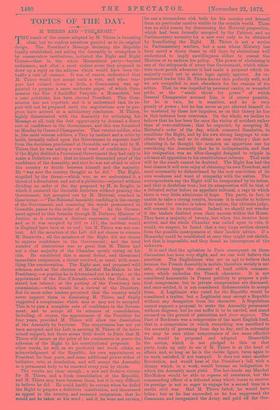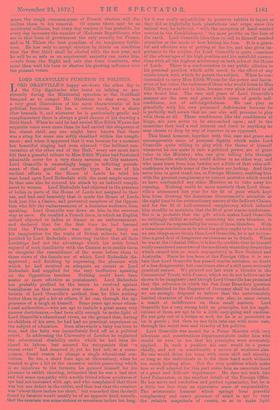TOPICS OF THE DAY.
M. TRIERS AND " THEIRIGHT."
THE result of the course adopted by M. Thiers is becoming clear, but we confess ourselves puzzled as to its original design. The President's Message declaring the Republic legally established, and asking the Assembly to strengthen it by conservative institutions, irritated the Right and Right Centre—that is, the whole Monarchical party—beyond endurance„ and after a most violent scene they proposed to draw up a reply on the address which would have been vir- tually a vote of censure. It was, of course, understood that M. Thiers would not accept such a vote, and when tem- pers had calmed down a little, a Commission was ap- pointed to prepare a more moderate paper, of which Com- mission the Dec d'Andriffet Pasquier, a Monarchist, but a sane politician, has been elected President. This Com- mission has not reported, and it is understood that its re- port will not be prepared until the negotiations now in pro- gress have arrived at a satisfactory conclusion. M. Thiers, highly discontented with the Assembly for criticising his Message at all, took the first opportunity to demand a direct vote of confidence in the Government, and this was furnished on Monday by General Changarnier. That veteran soldier, who is, like most veteran soldiers, a Tory by instinct and a critic by habit, formally called upon the Government to separate itself from the doctrines proclaimed at Grenoble, and was told by M. Thiers that he was asking a vote of want of confidence ; that if the Right disliked a Provisional Government they had only to make a Definitive one ; that he himself demanded proof of the confidence of the Assembly, and that he was not afraid to allow the country to decide between himself and the majority. He "was sure the country thought as he did." The Right, stupified by the threat—which was, as we understand it, a threat of a dissolution, and not of a phibiscite—rejected without dividing an order of the day proposed by M. de Broglie, in which it censured the Grenoble doctrines without praising the Government, but accepted one by M. Mettetal, coached in these terms:—" The National Assembly, confiding in the energy of the Government, and censuring the words pronounced at Grenoble, passes to the order of the day." As the Govern- ment agreed to this formula through M. Dufaure, Minister of Justice, as it contains a distinct expression of confidence, and as it was accepted by 267 to 117, the incident would in England have been at an end ; but M. Thiers was not con- tent. All the members of the Left did not choose to censure M. Gambetta ; all the members of the Right did not choose to express confidence in the Government ; and the total number of abstentions was so great that M. Thiers had not a clear majority of the Chamber openly voting on his side. He considered this a moral defeat, and threatened immediate resignation, a threat received, as usual, with some- thing like consternation. The Right met, and proposed wild schemes, such as the election of Marshal MacMahon to the Presidency,—a position he is determined not to accept ; or the appointment of the Due d'Aumale,-=which the Duke, it is stated, has refused ; or the putting of the Presidency into commission,—which would be a revival of the Directory. But its more sober leaders perceived that the country would never support them in dismissing M. Thiers, and finally suggested a compromise, which may or may not be accepted. This is to pass a complete vote of confidence in the Govern- ment, and to accept all its schemes of consolidation, including, of course, the appointment of the President for four years, provided M. Thiers will allow the dissolution of the Assembly by fractions. The compromise has not yet been accepted, and the Left is assuring M. Thiers of its deter- mined support, but there seems little doubt in Paris that M. Thiers will secure as the price of his continuance in power the adhesion of the Right to his constitutional proposals. In other words, he will, as we predicted last week, obtain an acknowledgment of the Republic, his own appointment as President for four years, and some additional power either of initiative, veto, or dissolution, and will accept the Assembly as a permanent body to be renewed every year by thirds.
The results are clear enough ; a new and decisive victory for M. Thiers, and a fresh consolidation of the Republic, and M. Thiers may have foreseen them, bait is very difficult to believe he did. He could hardly be certain when he defied the Right to prepare a definitive constitution, and threatened an appeal to the country, and menaced resignation, that he would not be taken at his word ; and if he were not certain, he ran a tremendous risk both for his country and himself from no particular motive visible to the outside world. There was no solid reason for denouncing the Mettetal proposition, which had been formally accepted by the Cabinet, and no Parliamentary necessity for a new vote only to be obtained by humiliating the Right. M. Thiers is not a novice in Parliamentary warfare, but a man whose Ministry has been saved a dozen times in old days by abstentions well understood to imply unwillingness either to unseat the Minister or to endorse his policy. The power of abstaining is one of the safeguards of every free Government, which other- wise must perish whenever it had made a proposal which its majority could not in strict logic openly approve. An ex- perienced leader like M. Pliers knows this perfectly well, and we are compelled to seek elsewhere for the reasons of his. action. That he was impelled by personal vanity, or wounded pride, or the "senile thirst for power" of which General Changarnier accused him, is of course possible,. for he is vain, he is sensitive, and he is very greedy of power ; but he has never as yet allowed himself to. be mastered by these low impulses, as on this theory he has. in this instance been overcome. On the whole, we incline to believe that he has been for once the victim of accident rather than of over-craftiness ; that he expected, by accepting M. Mettetal's order of the day, which censured Gambetta, to conciliate the Right, and by his own strong language to con- ciliate the Left, and so to obtain an easy victory ; that not obtaining it, he thought the occasion an opportune one for- convincing the Assembly that he is indispensable, and that his resignation was an after-thought designed to cripple in. advance all opposition to his constitutional reforms. That such will be the result cannot be doubted. The Right has had the best chance it will ever enjoy of obtaining its own President, and must necessarily be disheartened by the new conviction of its own weakness and want of sympathy with the nation. The correspondents say the Right will be exasperated by its defeat, and that is doubtless true ; but its exasperation will be that of a defeated suitor before an appellate tribunal, a rage in which there is very little admixture of hope. The party, in fact, is. unable to take a strong resolve, because it is unable to believe that when the resolve is taken the nation, the ultimate judge, will consent to its execution. Indeed, we should not wonder if the leaders doubted even their success within the House. They have a majority of twenty, but when the decisive hour arrived, and the whole Chamber was called upon to vote, it would, we suspect, be found that a very large section shrank from the possible consequences of their leaders' advice. If a Monarchy could be established at once they might not shrink, but that is impossible, and they dread an interregnum of the unknown.
It is said that the agitation in Paris consequent on these discussions has been very slight, and we can well believe the assertion. The Englishmen who are so apt to believe that because the French Assembly is mobile, therefore society is not safe, always forget the element of hard selfish common- sense which underlies the French character. It is not considered honourable in France publicly to propose a poli- tical compromise, but in private compromises are discussed, and once settled, it is not considered dishonourable to accept them. A Legitimist who voted for the Republic would be considered a traitor, but a Legitimist may .accept a Republic without any derogation from his character. A Republican cannot support a proposal to make the Assembly permanent without disgrace, but he can suffer it to be carried, and stand excused on the ground of patriotism and force tnajeure. The Pact of Bordeaux was a compromise of the most English kind, that is, a compromise in which everything was sacrificed to the necessity of governing from day to day, and in extremity we may be sure other compromises of the same effective kind would be proposed and adopted. Meanwhile the nation, which is not pledged to this or that party, looks up only to see if M. Thiers is at the head of affairs, and, so long as he is the visible figure, turns again to its work, satisfied, if not tranquil. It does not want another Revolution, and would hear of the President's fall with a dismay which, in a week, would become an indignation to which the Assembly must yield. The hot-heads say Marshal MacMahon would be able to repress all resistance, but the commanding officer of a defeated army which burns to recover its prestige is not so eager to engage for a second time in a sterile civil war. Had M. Thiers failed, he would have fallen ; but as he has succeeded, as he has suppressed the Commune, and reorganised the Army, and paid off the Ger- mans, the rough common-sense of French electors will dis- incline them to his removal. Of course there may be an accidental collision, but every day renders it less probable, for every day increases the number of Moderate Republicans, who see in that form of government the only security for. France, and in M. Thiers the best guardian of its temporary feeble- ness. He has only to accept election by thirds on condition that the first third shall be elected with the new year, and he will be as safe as an acquiescent majority can make him, —safe from the Right, and safe also from Gambetta, who must then wait his turn or shatter his growing influence over the peasant voters.



































 Previous page
Previous page